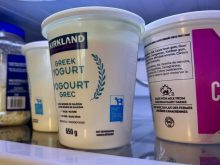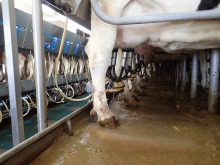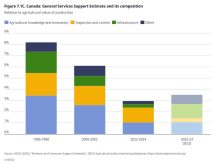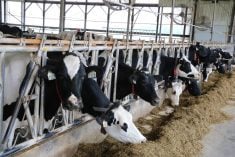Dairy farmers and processors are welcoming a $350-million investment in their sector ahead of the Canada-Europe Trade Agreement coming into force.
The $250 million over five years, available through the Dairy Farm Investment Program, will assist farmers to update their equipment to improve productivity, said an announcement from Agriculture Minister Lawrence MacAulay. The money would be available for robotic milkers, automated feeding systems, and herd management tools.
The $100 million, allocated over four years in a Dairy Processing Investment Fund, will assist processors to modernize their operations to improve efficiency and productivity and diversify their product lines for new market opportunities.
Read Also

KAP flags risky trade for Manitoba farmers
Tariffs, market access uncertainty, trade diversification and export infrastructure top the agenda at Keystone Agricultural Producers (KAP) annual meeting.
In the coming weeks, the government will engage with the dairy sector to seek input on the design of programs to ensure it responds to the needs of producers and processors, the minister added.
Dairy Farmers of Canada president Wally Smith said the federal money will foster the continued growth of the sector, for the benefit of all Canadians but only partially addresses the damage the trade deal with Europe will create.
“The government has taken a significant step in demonstrating its commitment to supply management, and to the continued innovation and growth of Canada’s dairy sector; for that, DFC gives thanks,” Smith said. “However, in order to ensure the continued sustainability and viability of supply management, there is still work to be done and the government has a significant role to play.”
The details of the implementation and accessibility of these funds will be established through a future consultation process, where DFC will insist upon the effective and equitable delivery of the entire funding envelope.
CETA will result in an expropriation of up to two per cent of Canadian milk production, representing 17,700 tonnes of cheese that will no longer be produced in Canada. This is equivalent to the entire yearly production of the province of Nova Scotia, and will cost Canadian dairy farmers up to $116 million a year in perpetual lost revenues.
Earlier this year, MacAulay said the new Liberal government would honour the Harper government commitment to provide the dairy industry with up to $4.3 billion worth of compensation to offset the impact of the trade deal.
“This announcement is a significant first step,” said Jacques Lefebvre, president and CEO of the Dairy Processors Association. “Our sector needs transitional measures to help it adapt to the tariff-free import of cheese from Europe — cheeses that will be displacing products made here at home with milk from our Canadian producers.”
A key issue is the allocation of new cheese tariff-rate quotas, he added. Dairy processors and producers have advocated the government assign the TRQ to the sector that will be truly impacted by CETA coming into force, the dairy-processing sector.
“The allocation of these TRQ to dairy processors is a key step the federal government must take in support of the Canadian dairy-processing sector. With CETA, our domestic cheeses will be displaced by European ones, the potential impact on jobs and investments is real. The decision is now in the hands of Trade Minister Chrystia Freeland. As we await her decision, we can only hope she has heard the industry,” Lefebvre said.
“Canadian dairy farmers appreciate seeing the government deliver in these two key areas,” said Bruno Letendre, president of Les Producteurs de lait du Québec (PLQ) and member of the DFC Board of Directors. “We are concerned that several of our other issues remain outstanding. Canada’s domestic regulations and border measures were not addressed in today’s announcement, as the government led us to believe they would be. I am hopeful that the government will balance today’s announcement with concrete action to stop further damage to Canadian dairy farmers to show it fully supports the supply management system.”
DFC also lauded the government for recognizing that infrastructure investments like this one have a significant role to play supporting the economy.
“We are pleased that the government is providing financial incentives for processors, so that our industry can continue to invest in the modern infrastructure required to meet the demands of Canadian consumers,” said Ralph Dietrich, chair of Dairy Farmers of Ontario (DFO) and member of the DFC Board of Directors.
They also pointed out the processing sector is going to be hurt.
“It’s simple, the cheese that is not produced here at home equates to milk dairy processors will not be buying from producers. This is why we support the producers’ call for adequate transition measures, to ensure that we continue to have a thriving dairy industry here at home for generations to come,” Lefebvre said.















